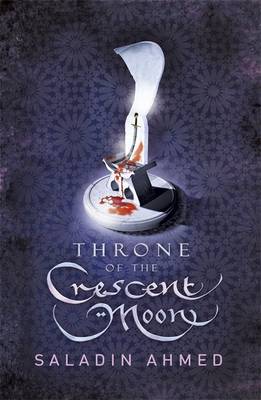Reviewed by Briana @ Pages Unbound on
Throne of the Crescent Moon was an interesting, character-driven fantasy with more personal reflection than plot. The story is not an action-packed fight to death against ghuls, as one might glean from the official summary, but rather a painstakingly planned battle against a mysterious ghul-raiser that involves more books and research than it does swords. Funnily enough, even a few of the characters are a bit annoyed by this.
But they are not only impatient with the pacing, they are impatient with each other—and this is another area where the reader can probably agree. Just about every character has a single thing on which he or she likes to harp: the Doctor is old and tired and does not want this responsibility anymore, Raseed wants to be a better dervish more focuses on God and will quote endless amounts of their sacred Scriptures to prove it, and Zamia just wants revenge, NOW. Their distinct personalities are great, and in the end they and the more minor characters form a beautiful raggedy family, but it would have been refreshing if they each had more than one thing they liked to talk/think about.
Ahmed’s main concern seems to have been to make his characters are human as possible by giving them such glaring flaws. He also frequently employs rather familiar and vulgar language*. The Doctor is called an “old fart” numerous times, sometimes in reference to himself, and there are a decent amount of references to excrement and whores. Overall, this type of dialogue was a bit jarring and detracted from the fantasy aspect.
In the same vein, the official summary’s claim that this book has the magic of the Arabian Nights is a bit of a stretch. There is not much magic, and what magic there is does not happen to be very flashy. The other aspects of the book are not particularly magical either. The world may be foreign to most readers, but it is gritty, crowded, and smelly. Not much comes across as an exotic dream here, particularly since the characters are not even well off enough to live in the nice part of the city.
These shortcomings were somewhat discouraging, particularly with all the critical praise being heaped on this book. However, completely unexpectedly, the last quarter of the book was completely enthralling. Previously I had been reading a chapter a day, skipping days in between chapters. I read the end in a single sitting, staying up to the wee hours of the morning. There was action, excitement, and more than one fantastic plot twist. It was amazing. The characters even got over their woes. If Ahmed can continue to write the way he wrote this conclusion, he will release a gripping and imaginative sequel, and I could actually recommend the series.
*To clarify, the book started coming closer to realism than fantasy for me when characters walked up to each other and greeted them as “you old fart” or “you fat son of a goat” (not an actual quote, but it captures the spirit of some of the characters’ exchanges). By vulgar language, I mean that in the middle of their quest to save the city, they would suddenly say things like, “I just farted” or “This street smells like piss.” Not my idea of magical.
I am also not attempting to make any value judgment about realism. I intended merely to express my surprise at how realistic this book is, as the official summary, the cover, the title, or even other reviews never gave me this impression.
Further, by describing the book as realistic, I did not mean to discourage anyone from reading it, including “sensitive” readers. While I maintain that frequent references to bodily functions do not add joy to my day and are not common in polite conversation, I acknowledge that this book is relatively clean. Anyone who is a bit particular about the books they read should be aware there are no sex scenes in this book, which I think would be a much larger deterrent than a reference to the fact humans do not process their food 100% efficiently.
Reading updates
- Started reading
- 31 January, 2012: Finished reading
- 31 January, 2012: Reviewed
